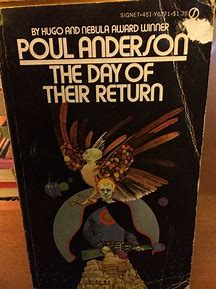The Day Of Their Return.
Tinerans have "...red-brown skins..." (5, p. 109) This is the kind of detail that we read once and then forget in a novel but would see all the time in a visual medium.
They speak Haisun and archaic Anglic, the latter making "...excessive use of articles..." (p. 110) Thus, Mikkal of Redtop says:
"'That's a rifle to envy... A ten-millimeter Valdemar convertible...'" (ibid.)
- whereas a nord like Ivar would have said:
"That's rifle to envy... Ten-millimeter Valdemar convertible..."
Gabriel Stewart says:
"'...if prophet didn't know...'" (15, p. 193)
Tatiana Thane replies:
"'Prophet did know!...'" (ibid.)
The Riverfolk add a new indefinite article:
"'That was one coffin.'" (12, p. 169)
"'I have heard about one seer...'" (ibid.)
"'This is one matter of definition...'" (13, p. 173)
The peoples of Aeneas are distinctive and consistent in every detail.

14 comments:
Kaor, Paul!
In that case MY "Old Anglic" would be thought archaic. Because I customarily make use of articles.
Ad astra! Sean
I'm slightly dubious about the degree of difference between groups. This is a planet that was settled by a technologically advanced culture and has always had rapid communications and data links.
Those tend to produce more uniformity.
Eg., here on earth, Western marriage patterns have spread inexorably to lots of people, places and cultures that didn't share them over the past century or two, and the process has accelerated steadily.
Kaor, Mr. Stirling!
Yes, but Technic civilization was also spread fairly THINLY over hundreds of light years. Given that I can imagine cultures and sub-cultures, even on single planets, developing varying speech patterns, if given centuries to evolve.
Ad astra! Sean
Technic civilization is spread thinly. But people -on a single planet- aren't. They have instant communication everywhere, data links, cheap power from fusion reactors, and antigravity transport.
Kaor, Mr. Stirling!
And you believe such factors would encourage a standardizing or homogenizing at least of Anglic on those planets. I can see that while still thinking other dialects or languages would survive. As was the case on Dennitza, for example.
Ad astra! Sean
People learn languages and stick to customs if they're something in it for them, whether material or psychological.
Language-areas tend to expand when communications are good, and shrink when they're bad.
If you were a peasant in say 1200, it was more useful to speak the local patois because most of the people who you communicated with did. As communications improve and your interaction sphere gets bigger, other things become more useful.
Kaor, Mr. Stirling!
That makes sense to me. I agree.
In a remote English country village of 1200, the parish priest would know Latin and the local Anglo-Norman baron or holder of a knight's fee manor would probably still speak French. But everybody else would speak that local patois.
Ad astra! Sean
Sean: you can see the process at work in Caxton's translation of the Bible into English.
He tells a story of a bunch of merchants from northern England who are trying to buy eggs from a farmwife in Kent.
The problem is that they use the word "eggs", which is ultimately Old Norse, and she uses "eyren", which is Old English.
There's a series of misunderstandings; at one point the farmwife says "I am sorry sir, I speak no French", and the Yorkshire merchant yells back: "I also speak no French!"
He uses this to illustrate why he uses London dialect in his translation -- it was the best compromise available.
Ultimately everyone agreed on "eggs" in modern English.
(NB: the post-medieval London dialect of English was heavily influenced by immigration from the East Midlands after the Black Death, and the East Midland area was part of the "Danelaw", the Viking-settled part of England, and its English dialect has a lot of Norse loan-words in it. About 900 in common use, IIRC. "Sky" and "skirt" are among them, btw, -- anything with an initial "sk" is ultimately Norse. The English equivalents have "sh". Skirt and shirt were the same word originally, in Proto-Germanic, and developed differently in the languages ancestral to English and Norwegian respectively. The Old English word for "sky" was "luft", as it still is in German.)
Luftwaffe! Ghood Ghod!
The combox is more informative than the blog.
Kaor, Mr. Stirling!
Interesting and amusing, that story coming from Caxton.
If the Black Death had not devastated Europe and England, English might have developed very differently. I mean, without that influx of new Londoners from the old Danelaw, the dialect predominant in London before 1346 might have become the basis of a very different standard English of the kind we have today.
Ad astra! Sean
Sean: and we'd be saying 'luft' instead of 'sky'.
The Wessex dialect that was the official standard before 1066 was extremely conservative, in its syntax, vocabulary and its sound system. People in that area were saying 'geboren' for 'born' there as late as the 1600's.
Kaor, Mr. Stirling!
And the English we speak and write today would seem a lot more Germanic!
Ad astra! Sean
And English, despite all its Lain influence, remains a Germanic, not a Romance, language.
Post a Comment